Managing Folders
This topic discusses ways to maintain folder properties and update folder security for categorized content. It also provides information on assigning member privileges, selecting folder data sources and publishing categorized content folders.
|
Page Name |
Definition Name |
Usage |
|---|---|---|
|
Browse Categorized Content |
EPPCM_HIERTOP_MAIN |
Create hierarchies for classification and navigation. |
|
EPPCM_CATG_MAIN |
Set the properties for a new folder or to update property details for an existing folder. The Folder Properties page is used for top folders as well as for subfolders. |
|
|
Top Folder Properties - Advanced Feed Options |
EPPCM_FEED_ADVOPT |
Set up advanced options to publish a folder in the content management system so that it is accessible as a feed. The Publish as Feed link is available on all folder properties pages if the folder can be published and you have permissions to publish the folder. See Publications Properties - Advanced Feed Options Page for more information. |
|
EPPCM_CATG_MEM |
Add the administrators who can edit this folder and the users who can view the folder and its content. This page lists the members and privilege sets for the current folder. Actual privileges are assigned on the Folder Security - Set Members Privileges page. |
|
|
EPPCM_CATG_PRIV |
Assign privilege sets to the selected member. |
|
|
EPPCM_CATG_TREEMOD |
Change the location of a subfolder. If the user performing the move is a top administrator, a subfolder can also be promoted to be a top folder for the content management feature. |
|
|
Move Content Page |
EPPCM_CONT_TREEMOD |
Move content to a new folder. |
|
EPPCM_CATG_SPIDR |
Select folder data sources. Information on this page is required only if you are going to use the categorization spider to automatically create folders and add content. |
Use the Folder Properties page (EPPCM_CATG_MAIN) to set the properties for a new folder or to update property details for an existing folder.
Navigation:
Click the Properties link for the folder that you want to access on the Browse Categorized Content page.
This example illustrates the fields and controls on the Folder Properties page. You can find definitions for the fields and controls later on this page.
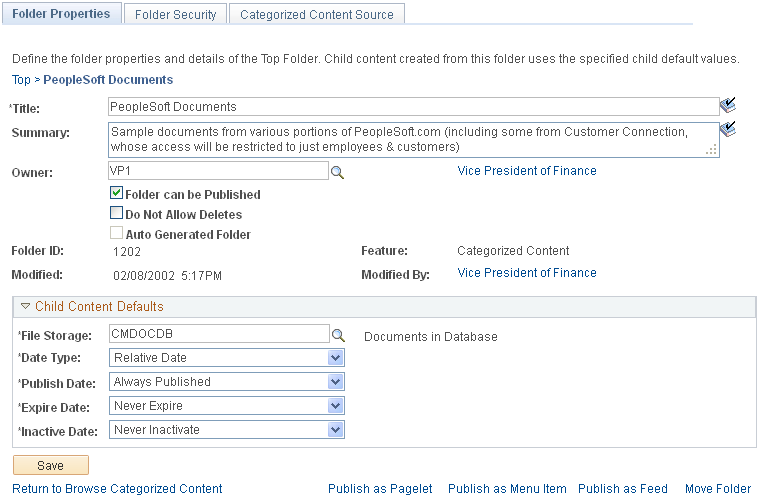
Users can add folders or update properties at any level for which they have authorization. Only top administrators can create top folders at the root of a feature’s folder hierarchy. At subsequent levels, any folder members with the proper privilege can add folders or update properties.
Field or Control |
Description |
|---|---|
Summary |
Add a brief description of the content. This field supports HTML entries. |
Owner |
Assign the owner of the folder. Click the name link of the owner to access the Instant Message page, where you can send an instant message to the owner. |
Folder can be Published |
Select to allow for publishing of this folder as a pagelet or menu item. Even with this option selected, only users with the Publish Folder or Unpublish Folder privilege will see the Publish as Pagelet, Publish as Feed, and Publish as Menu Item links. |
Do Not Allow Deletes |
Select to prevent this folder from being deleted from the folder hierarchy or from being deleted during the purge process. |
Auto Generated Folder |
Indicates whether this folder was created manually or by the spider process. |
Publish as Pagelet |
Click to access the Publish Pagelet Wizard Definition page, where you can publish a folder in the PeopleSoft Content Management system as a pagelet. Note: This link is available only when the Folder can be Published option is selected. |
Publish as Menu Item |
Click to access the Publish as Menu Item page, where you can publish a folder in the content management system so that it's accessible as a link in the left navigation menu. Note: This link is available only when the Folder can be Published option is selected. |
Publish as Feed |
Click to access the Publish Feed Definition page, where you can publish a folder in the content management system so that it is accessible as a feed. Note: This link is available only when the Folder can be Published option is selected. |
Move Folder |
Click to access the Top Folder Properties - Move Folder page, where you can change the location of this folder. |
Child Content Defaults
Child content created from this folder uses the default values specified here.
Field or Control |
Description |
|---|---|
File Storage |
Select the storage locations for any content that is attached files. Available locations are based on those defined on the Define File Storage page. See File Storage Page. |
Date Type |
Select either Relative Date or Absolute Date to define content default publish and expiration dates for this folder. |
Publish Date |
Select the publish date for the default values of the content in this folder. |
Expire Date |
Select the expiration date for the default values of the content in this folder. |
Inactive Date |
Select different periods of time as dates when the content will become inactive. You can also select the option to not inactivate the content. Available options are:
|
Use the Folder Security page (EPPCM_CATG_MEM) to used to manage the folder members and their privileges.
This page lists the members and privilege sets for the current folder. Actual privileges are assigned on the Folder Security - Set Members Privileges page.
Navigation:
Click the Properties link on the Browse Managed Content page.
Select the Folder Security tab on the Folder Properties page.
This example illustrates the fields and controls on the Folder Security page. You can find definitions for the fields and controls later on this page.
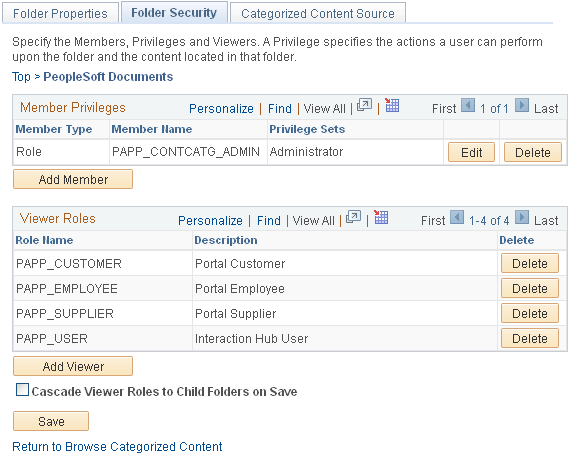
A new folder automatically inherits the members and privileges of its parent folder. However, privileges added later are not automatically transferred down the folder hierarchy and must be updated on a folder-by-folder basis. To assist with this process, an Inherit Members button appears when you view folder security for any subfolder, enabling you to quickly duplicate the same members as assigned to the parent folder.
The Folder Security page is also used to manage the audiences allowed to view the published content of categorized content folders. These viewing audiences are similar to the viewer roles defined on the Viewer Roles page. Within categorized content, the folder administrator should try to choose among the same limited set of roles.
Note: A top administrator is automatically granted all privileges for all content and folders of the feature without being an explicitly assigned or listed member a folder.
Field or Control |
Description |
|---|---|
Member Privileges |
Displays type, name, and privilege sets for the members of the folder. Privileges specify the actions that a member can perform on the folder and the content contained in this folder. Note: A viewer member privilege defined in the Member Privileges section of the page is not equivalent to a viewer role defined in the Viewer Roles section of the page, even if the same role ID is used. In the case of the former, a viewer member privilege allows that member to view the folder and all of its contents (in draft, pending, or published states) through the folder hierarchy. The latter allows users with that role to view published content only and only through the Browse by Category page. |
Edit |
Click to edit privileges of this member. |
Delete |
Click to remove the member and prohibit him or her from accessing content from this folder. |
Add Member |
Click to access the Folder Security - Set Members Privileges page to assign members and determine the actions that they can perform on the folder and the content located in that folder. |
Inherit Members |
Click to inherit members from the parent folder. |
Viewer Roles |
Displays name and description for viewer roles. The viewer roles:
Note: When you are publishing folders with security roles, folders are published based on your defined viewer roles rather than member privileges. |
Add Viewer |
Click to add another row and select a user role to add to the list. |
Inherit Viewers |
Click to add viewers from the parent folder. |
Cascade Viewer Roles to Child Folder on Save |
Select to add these roles to all child folders that you have access to when you save this folder. Note: If this process encounters a child folder that you do not have privileges for, the cascading of viewer roles stops at that folder and does not continue to the child folders that follow. Changes to viewer roles can be cascaded to subfolders; however, changes to member privileges must be updated in the subfolders manually. |
Use the Folder Security - Set Members Privileges page (EPPCM_CATG_PRIV) to assign privilege sets to the selected member.
Navigation:
Click the Add Top Folder button, and click the Properties link.
Select the Folder Security tab on the Folder Properties page.
Click the Edit button on the Folder Security page.
This example illustrates the fields and controls on the Folder Security - Set Members Privileges page: Categorized Content.
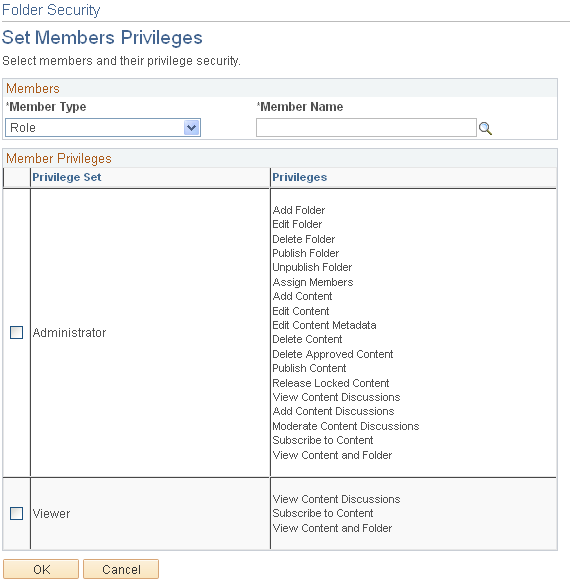
Field or Control |
Description |
|---|---|
Member Type |
Select a membership type of User or Role. |
Member Name |
Select a member name. |
Privilege Set |
Assign privileges to this member by selecting privilege sets. Note: The privilege sets and privileges listed for each set reflect the privilege sets that were defined for the Categorized Content feature. |
See Privilege Sets Page.
Use the Folder Properties - Move Folder page (EPPCM_CATG_TREEMOD) to change the location of a subfolder.
If the user performing the move is a top administrator, a subfolder can also be promoted to be a top folder for the content management feature.
Navigation:
Click the Add Top Folder button, and click the Properties link.
Click the link on the Folder Properties page.
This example illustrates the fields and controls on the Folder Properties - Move Folder page.
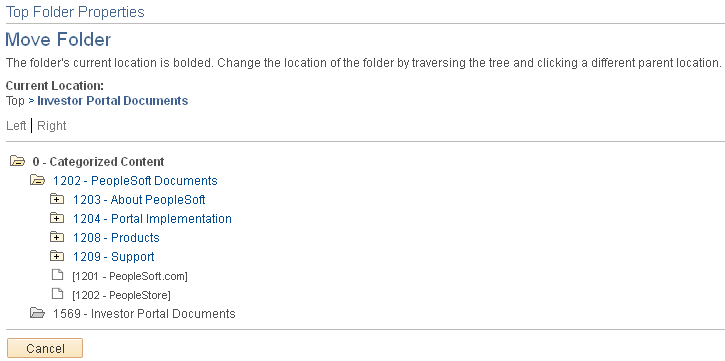
Use this page to move a folder to a different parent folder. The folder in bold type represents the folder's current location. Only top administrators can move a folder to the top folder position. To do so, select the 0–Categorized Content location. Auto-generated folders cannot be moved.
Navigate the tree by clicking the folders. Select a new location from the available values. These values are based on your privileges. You must have the Delete Folder privilege in the current location, as well as Add Folder privileges on the new parent location to move a folder.
In the Folder Properties page (select click the Properties link), the Folder can be Published option enables approved content to be imported and published in features outside of categorized content. You must select this option for publishing features to import or reference categorized content. In addition, the Folder can be Published option enables you to publish this folder as a pagelet, menu item, or feed.
Note: Even with the Folder can be Published option selected, only users with the Publish Folder or Unpublish Folder privilege will see the Publish as Pagelet, Publish as Menu Item, or Publish as Feed link.
Field or Control |
Description |
|---|---|
Publish as Pagelet |
Click to access the Publish Pagelet Wizard Definition page, where you can publish a folder in the content management system as a pagelet. Note: This link is available only when the Folder can be Published option is selected. |
Publish as Menu Item |
Click to access the Publish as Menu Item page, where you can publish a folder in the content management system so that it's accessible as a link in the left navigation menu. Note: This link is available only when the Folder can be Published option is selected. |
Publish as Feed |
Click to access the Publish Feed Definition page, where you can publish a folder in the content management system so that it is accessible as a feed. Note: This link is available only when the Folder can be Published option is selected. |
Use the Content Source page (EPPCM_CATG_SPIDR) to select folder data sources.
Navigation:
Click the Add Top Folder button, and click the Properties link.
Click the Content Source tab on the Folder Properties page.
This example illustrates the fields and controls on the Content Source page.
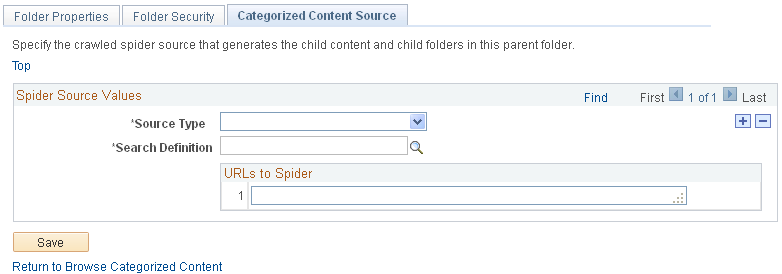
Note: Values on this page are required only if you use the categorization spider to automatically create folders and add content.